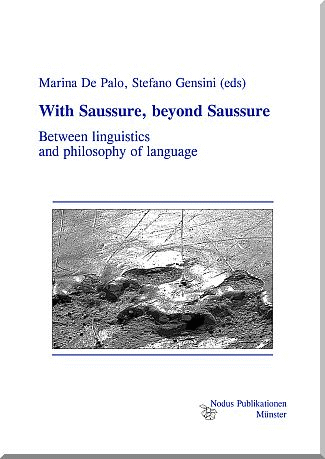With Saussure, beyond Saussure. Between linguistics and philosophy of language, ed. by Marina De Palo, Stefano Gensini. Münster, Nodus Publikationen, 2022, 170 p., ISBN 978-3-89323-027-3, € 43
Notice de l’Éditeur
Préface et table des matières

The centenary of the publication of CLG, which was celebrated in 2016, represented an important occasion for reviewing the dispersion and the influence of Saussurean thought in twentieth-century European linguistics and philosophy. Many scientific events in Geneva, Paris and Rome celebrated this anniversary, once again concentrating critical and theoretical reflection on this work which changed the orientation, not only of modern linguistics in the 1900s, but also of the whole gamut of human sciences, becoming the point of reference for struc-turalism and post-structuralism. The Laboratory of the History of Linguistic Ideas of the Department of Philosophy in the Sapienza University of Rome (Labsil) also contributed to organising a convention in Rome, in June of 2016, on the Roman school and Saussure’s reception (see Marina De Palo, Stefano Gensini (eds.), Saussure e la Scuola linguistica romana. Da Antonino Pagliaro a Tullio De Mauro. Roma: Carocci 2018) following dialogue between the Roman school and the Genevan school — two schools which, through the inter-pretative and philological work of Gödel and Engler on the Genevan side, and De Mauro on the Roman side, explored the complex and uncertain relationship which the CLG has with its handwritten sources. The present volume, setting out from the revival of the debate surrounding the Cours de linguistique générale (1916, 19222), intends to offer reconsideration and rereadings of certain fundamental points in the light of the results of recent studies and of the knowledge acquired from the plurality of linguistic-philosophical traditions within which this work was received in the 1900s […].
In this varied tableau of essays, interwoven with a dynamic Humboldtian conception of language, the reader will glimpse throughout the golden thread of the speaking subject — a question often placed in the background of traditional structuralist approaches and revived in the present-day debate, above all in the field of the cognitive sciences.
Extrait de la préface des éditeurs

